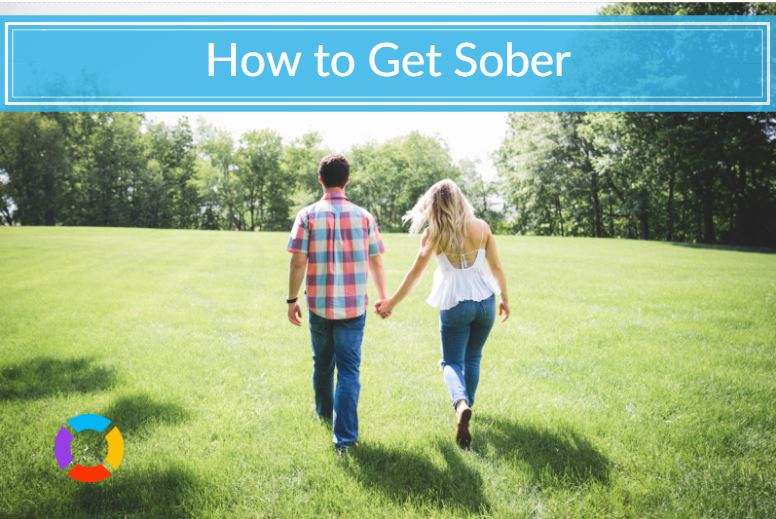How to Achieve Sobriety: A Step-by-Step Guide to Getting Sober

Addiction can be a physically and emotionally challenging experience. You may have tried many times to quit using only to feel the disappointment of relapsing again. While getting sober can be hard, it is possible.
The important thing to remember is that sobriety is a process and not a one-time event. Our step-by-step guide will cover what getting sober means and how to become sober.
What Does It Mean to Get Sober?
The term “sober” was born out of the AA model of recovery from alcoholism and has evolved to apply to many kinds of addiction.
Have questions about getting sober? Call now.
This is in contrast to the term “getting clean,” which is an outdated way to say free from drug use. “Sober” is now more often interpreted to mean total abstinence from all illicit or legal substances that cause life to become out of control. This could be anything causing a person to seek out more of the substance in spite of experiencing negative consequences. Through sobriety, you can transform your physical, emotional and behavioral health.
How to Get Sober
Getting sober is a long term commitment to lifestyle change. It requires structure, support and evidence based care.
- Decide to Get Sober
- Ask for Help
- Find Professional Treatment
- Get Through Withdrawal
- Stay Sober with Tools & Support
- Maintain Sobriety Long Term
It often takes multiple attempts to give up a substance, and many people are in and out of treatment before they can totally do so and begin a new life. Don’t let that discourage you from trying to get sober now.
Step 1 – Decide to Get Sober
The first thing to do is to decide if you are ready to quit. You need to be able to admit to yourself, “I need to get sober.” Stages of change begin with precontemplation. This takes place before you decide to change. When you’re in precontemplation, you might think that people need to just leave you alone about the subject until you’re ready.
The next stage is contemplation. Now, you may be considering a change but you’re not really sure if you can or are willing to do the hard work. Self-reflection is ultimately what drives commitment to quit. Preparation is when you start to make a plan about how to change. Finally, the action stage is when you start actively making behavioral changes necessary.
Step 2 – Ask for Help
Statistically, people who go “cold turkey” rarely succeed in maintaining long term sobriety. Support systems improve recovery outcomes. Receiving encouragement from peers can keep you motivated to make a change. Help is readily available with multiple websites, phone numbers and texting systems of support.
Step 3 – Find Professional Treatment
Getting sober is a step down process, and many insurance companies cover several levels of treatment. There are also many programs available for those with no insurance.
Beginning with withdrawal and stabilization, detox centers may use medications, sober housing, and evidence-based processes to help you remove harmful substances from your body, build new life skills, and learn how to cope with stressors in a healthy way.
Cost, the severity of your addiction, and location will play a role in deciding which level of care is best for you.
Outpatient vs Inpatient Rehab
The step down process usually begins with inpatient medically assisted detox. The longer a person stays in a treatment environment, the better their chances of staying sober long term. Outpatient services allow clients to return home at the end of their treatment each day, and do not include overnight stays.
A complete step down program will often involve the following:
- Medically supervised detox and withdrawal: 3 to 7 days: May be medically necessary to be longer depending on the length of use, amount and type of substance
- Inpatient residential stabilization: May last 25 to 45 days
- Partial hospitalization program (PHP): Four to six hours of programming a day: Available as a day program on an outpatient basis.
- Intensive outpatient programming (IOP): Nine to 12 weeks: Usually meets three times a week for three hours, totalling nine to 12 hours a week including group and individual sessions.
- Sober living housing: May last up to 2 years or longer: Sober communities are being built all over the country for longer-term lifestyle support.
- Outpatient therapy as a maintenance program: Beginning with six hours a week and dropping to once or twice a month.
- Peer support accompanies all these levels of treatment as part of a relapse prevention plan.
- Family and marriage counseling may be offered at any of these levels.
Evidence-Based Addiction Treatment
Facilities with licensed professionals use evidence-based treatments for substance use such as cognitive behavioral therapy and dialectical behavior therapy.
Call today, and take the guesswork out of getting sober.
Holistic approaches may also be used, including expressive therapies like equine and art therapy, alternative treatment modalities such as meditation and massage, aromatherapy and peer support groups to build sober living skills. Group and individual therapy are part of most programs and family sessions are also common.
Step 4 – Get Through Withdrawal
Detox involves the removal of harmful substances from your body through the body’s natural process of eliminating toxins.
Withdrawal from substances such as benzodiazepines and alcohol can be life threatening and should be medically supervised. Symptoms can occur due to the body’s response to the reduction of a substance that has been used for a long time. This is an indication of physical dependence.
Symptoms and Timeline of Withdrawal
Depending on what substance a person is withdrawing from, the timeline and symptoms of withdrawal can vary. Opioid withdrawal can make some individuals feel like they have the worst case of flu they have ever experienced and could lead to dehydration.
Alcohol and benzodiazepine withdrawal can potentially cause seizures and aspiration of vomit, which can be life threatening.
Other substances may cause severe mood swings, hallucinations, body aches and digestive problems. In most cases, these symptoms will generally improve over a three to five day period. The recovery of balance in brain chemistry can take longer.
Why Medical Detox is Safer
Medical detox is safer because medical professionals are trained to monitor your symptoms and make sure you avoid complications. For example, the use of opiate tapers has been proven to lessen the intense symptoms of withdrawal that may drive a person to go back to using. Getting admitted to a medically supervised withdrawal center will provide the emotional, physical, mental and spiritual support necessary for long term sobriety.
Step 5 – Stay Sober with Tools and Support
Treatment offers new ways to think about and live life. These tools can help you build a support system as you encounter day-to-day stressors that motivate people to use substances as coping mechanisms.

Coping Tools for Daily Life
There are a variety of tools that can help you overcome addiction. Some of the tools that might be useful to you include:
- HALT Method: HALT stands for hungry, angry, lonely and tired. These are emotions that commonly lead to poor decisions. By checking in with yourself to recognize if you’re in a vulnerable position, you can appropriately respond to the emotion you’re experiencing to avoid using substances.
- Cognitive behavioral therapy: This is a therapeutic approach that can teach you to modify negative thoughts that influence your addiction.
- Journaling: This coping mechanism involves writing down your thoughts and emotions as a means of managing them without resorting to unhealthy habits.
- Support Groups: Participating in support groups can provide you with encouragement from peers who understand the challenge of overcoming addiction.
Create a Relapse Prevention Plan
In all phases of treatment, creating a prevention plan is essential to addressing old behaviors and building new ones. Identifying historical traumas and unresolved grief that lead to using substances to cope with intense emotions will help you find better ways to express your thoughts and feelings. Relapse prevention plans evolve with treatment levels and are essential to long term lifestyle change.
Step 6 – Maintain Sobriety Long Term
How to Recover from a Relapse
Recognizing that relapse is a part of the process of getting sober is essential.
Sometimes people may reenter a higher level of treatment or they may just continue in their current level to evaluate their relapse prevention plan. It depends on how long the relapse lasted, how severe the substance use was, and recommendations by treatment providers.
Knowing where the plan went awry is a useful tool in prevention. The most important thing to realize about relapse, depending on how long a person has been abstinent from the substance, is that going back to use at the same level as before getting sober may cause overdose and death.
Relapse is dangerous, but it does not have to be the end of your efforts to get and stay sober.
Celebrating Milestones
Milestones such as the first 30, 60 or 90 days are important to celebrate with your peer support system. This helps you recognize your success and shows you that it is possible to get and stay sober. You have come through the hardest part of getting and staying sober and because you did that, you are capable of much more.
Aftercare and Long Term Recovery Plans
Long term sobriety requires a well thought out aftercare plan created by you and your treatment providers. Each aftercare plan evolves with the level of treatment. Long term recovery does not just happen. It is accomplished through planning, modifying and setting new goals along the way.
Know Where to Get Help Right Now
Getting sober is a lifelong commitment to improving yourself. It is not easy, but it is worth it. Ask anyone who has been sober for more than a few years and they will tell you that it is possible.
You can find help and support at a local detox facility near you, as well as any AA, NA or HA meetings in your area. You can also call help lines like 988 or 1-800-662-4357 (HELP), SAMHSA’s national addiction help line, or the number below.
Get started on getting sober today. Call now.
Why Getting Sober Can Change Your Life
Getting sober can extend your life span, heal relationships and create a whole new lifestyle of happiness. While the process of getting sober is difficult, it comes with peer support, treatment options and hope.
Hope is the greatest motivator for becoming sober, because the vicious cycle of addiction offers no hope of survival. People succeed every day in ending the cycle of addiction and living abundant and successful lives. Choosing to get sober is one of the best decisions a person will ever make in their life.
Frequently Asked Questions About Getting Sober
Ask yourself if you are ready to commit to doing the hard work and changing your lifestyle.
Are you ready for the ups and downs of fighting an addiction? Success is possible, but it is hard. You can do it, but are you ready and willing? You are not alone in the struggle. Support is available for anyone who wants to make the effort.
It is possible, but more difficult for many people. Detox is a dangerous and difficult process. A medically assisted treatment program is a better choice to begin the longer term process of recovery.
Having support through peers and professional treatment providers increases the potential for success. There are people who have succeeded who are ready to help, so you don’t have to do this journey alone.
It takes a lifetime of commitment to the process of detoxing, learning new life skills, developing new coping mechanisms for stressors and emotions, and addressing historical traumas and grief. Detox only lasts a few days, but recovery is a lifelong journey.
Surround yourself with the resources of support you need to continue in sobriety. Use the treatment system that provides a step down process. Build your support system around those who are experienced with long term sobriety. Don’t get discouraged by setbacks, keep on working at the process and eventually you will succeed.
It’s a good thing to want to help your friends get sober. An important step to doing that is being educated on the signs and symptoms of addiction and being ready with the resources to help someone get sober when they ask.
Don’t nag someone into getting sober, because it won’t work. Love them, support them in the process of getting help, and don’t enable their addictive processes. The best thing you can do for someone is be available when they’re ready, be prepared, and offer hope and support through the process.
If you or someone you love is struggling with addiction, help is available. Browse our online directory to find a qualified detox center near you or call the phone number below and confidential support. Your future is waiting!



